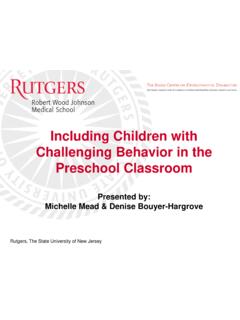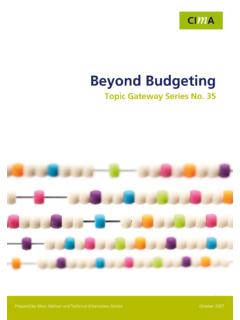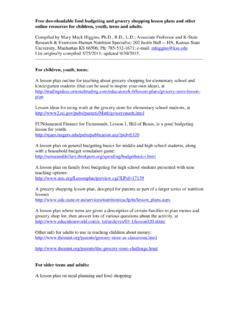Transcription of Budget Module wd - Robert Wood Johnson Medical School
1 budgeting Basics A Companion Guide to Keeping It Real: How to Get the Support You Need for the Life You Want budgeting Basics written by Anthony Camuso Keeping It Real written by Kathy Roberson, , Rick Blumberg, , and Dan Baker, The Elizabeth M. Boggs Center on Developmental Disabilities produced Keeping It Real: How to Get the Support You Need For the Life You Want with funding from the State of New Jersey, Department of Human Services, Division of Disability Services as part of the Real Choice Systems Change Grant # P-91556/2 from the Centers for Medicare and Medicaid Services, Department of Health and Human Services.
2 335 George Street Box 2688 New Brunswick, NJ 08903-2688 Phone: (732) 235-9300 Fax: (732) 235-9330 TDD Users: Dial 711 for New Jersey Relay Website: The Elizabeth M. Boggs Center on Developmental Disabilities/UMDNJ 1 Earning and spending It feels great to earn a paycheck. Whether you work part time at the mall, baby-sit on weekends, or cut lawns in your neighborhood, having a job is a big step towards your personal growth, independence, and buying things for yourself. However, sometimes it seems that even when you have a job you still may find you don t have enough money to buy all the things you want.
3 A new jacket, concert, ball game ticket, or music player may be things you have wanted. Having a savings plan and a Budget can help you save for both purchases like buying a jacket and bigger purchases like saving for new computer. budgeting is a very important step when it comes to successful money management. It allows you to see how much money you earn and spend over a period of time, and helps you to make good choices for both spending your money on what you need or want now, and saving your money for what you think you ll need or want in the future.
4 On the next page is an example of David s income (the money he earns) and his expenses (the money he spends) for a given month. Pay close attention to David s spending habits. Think about your own spending habits. Are they similar to David s? Do you sometimes spend more money on things that you want but do not really need? The Elizabeth M. Boggs Center on Developmental Disabilities/UMDNJ 2 David s Income & Expenses For the Month of May INCOME EARNED Part-time job at the mall $ Weekend work at Uncle Jim s barber shop$ Monthly allowance for doing chores at home $ TOTAL INCOME.
5 $ EXPENSES THIS MONTH SPENT Buying School lunch $ Purchasing a new video game $ YMCA club dues $ Buying new pair of sneakers $ Getting a haircut $ Going to movies with friends $ Paying for cell phone bill $ Buying birthday present $ Food for pet dog $ Monthly savings goal $ TOTAL EXPENSES : $ DIFFERENCE (Income minus Expenses, or Net Income)- ($ ) The Elizabeth M. Boggs Center on Developmental Disabilities/UMDNJ 3 Activity: What was David s total income for the month?
6 What were David s total expenses for the month? What is David s net income? (Net income is income minus expenses.) Is David's net income more than, less than, or equal to his expenses for the month? If his expenses are greater than his income, what expenses do you think he can reduce or eliminate? Why? What expense should David not reduce or eliminate? Why? The Elizabeth M. Boggs Center on Developmental Disabilities/UMDNJ 4 What are my own income and expenses? Now that you ve learned about David s earning and spending habits it s time to learn about your own.
7 Use the table on the next page to keep track of your income and expenses for a period of one month. Real World Math authors Donna Guthrie and Jan Stiles, suggest the following key steps for tracking your income and spending. 1. Include all sources of income. Identify where you get your money - allowance, part-time jobs, gifts, etc. What you make may vary from month to month so try to look for trends. For example, you may have more income on the month of your birthday or around special holidays. 2. Don t forget about taxes! Make sure you base your earnings on the money that you actually take home (net salary) and not on your total salary (gross salary).
8 Don't forget that income taxes and Social Security taxes are deducted from what you earn. If you like to learn more about taxes and how it affects your earnings refer to the resources section at the end of this chapter. 3. Keep track of everything you spend. Keep tabs on everything you spend - even the littlest things. Keeping an accurate record of your spending habits will go a long way towards helping you understand where your money is going. Also, be sure to save your receipts for everything you buy. This will also help you to keep better track of your expenses.
9 The Elizabeth M. Boggs Center on Developmental Disabilities/UMDNJ 5 My Income & Expenses for the Month of _____ INCOME EARNED $ $
10 $ TOTAL INCOME: $ EXPENSES THIS MONTH SPENT $ $ $









